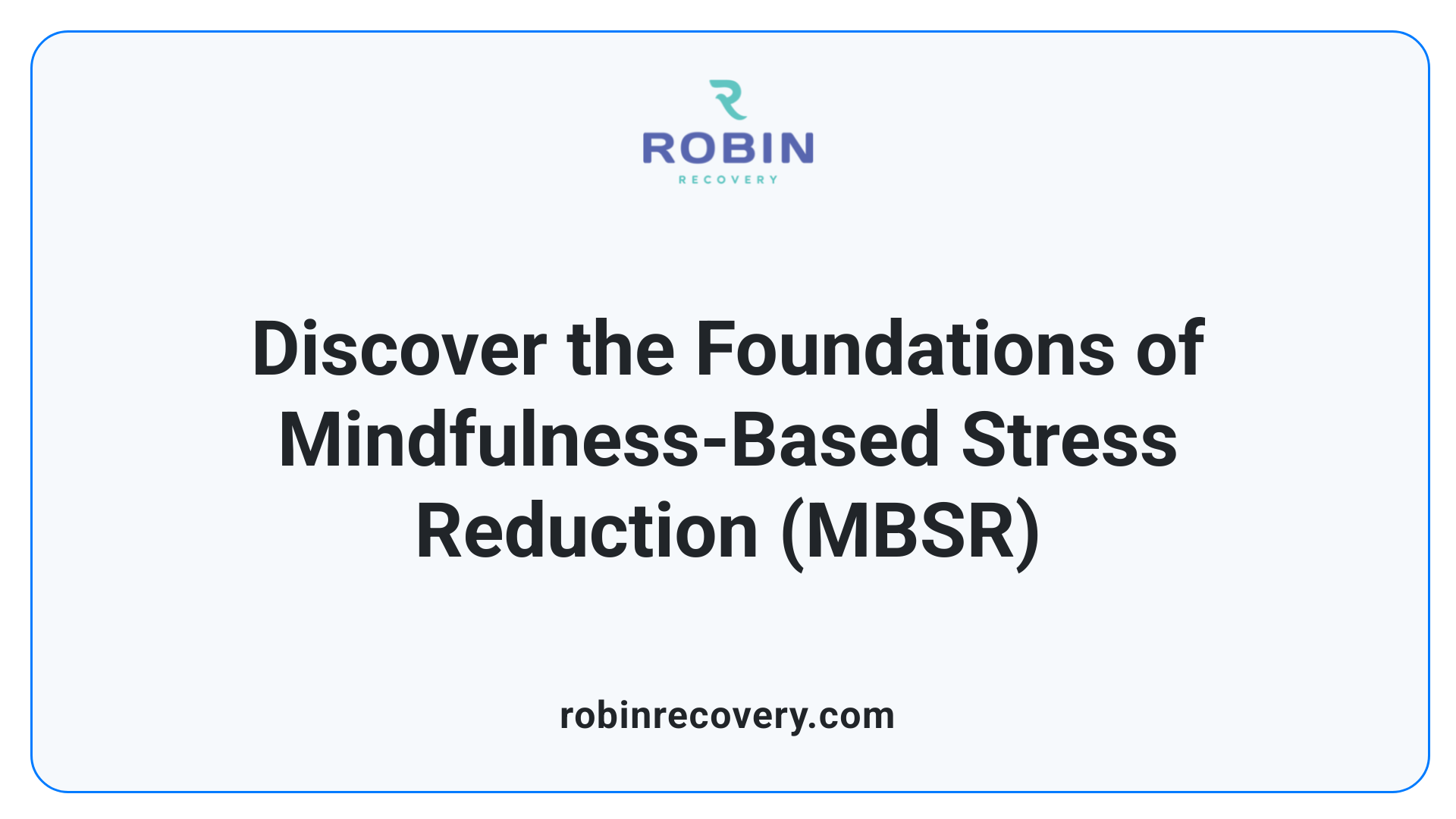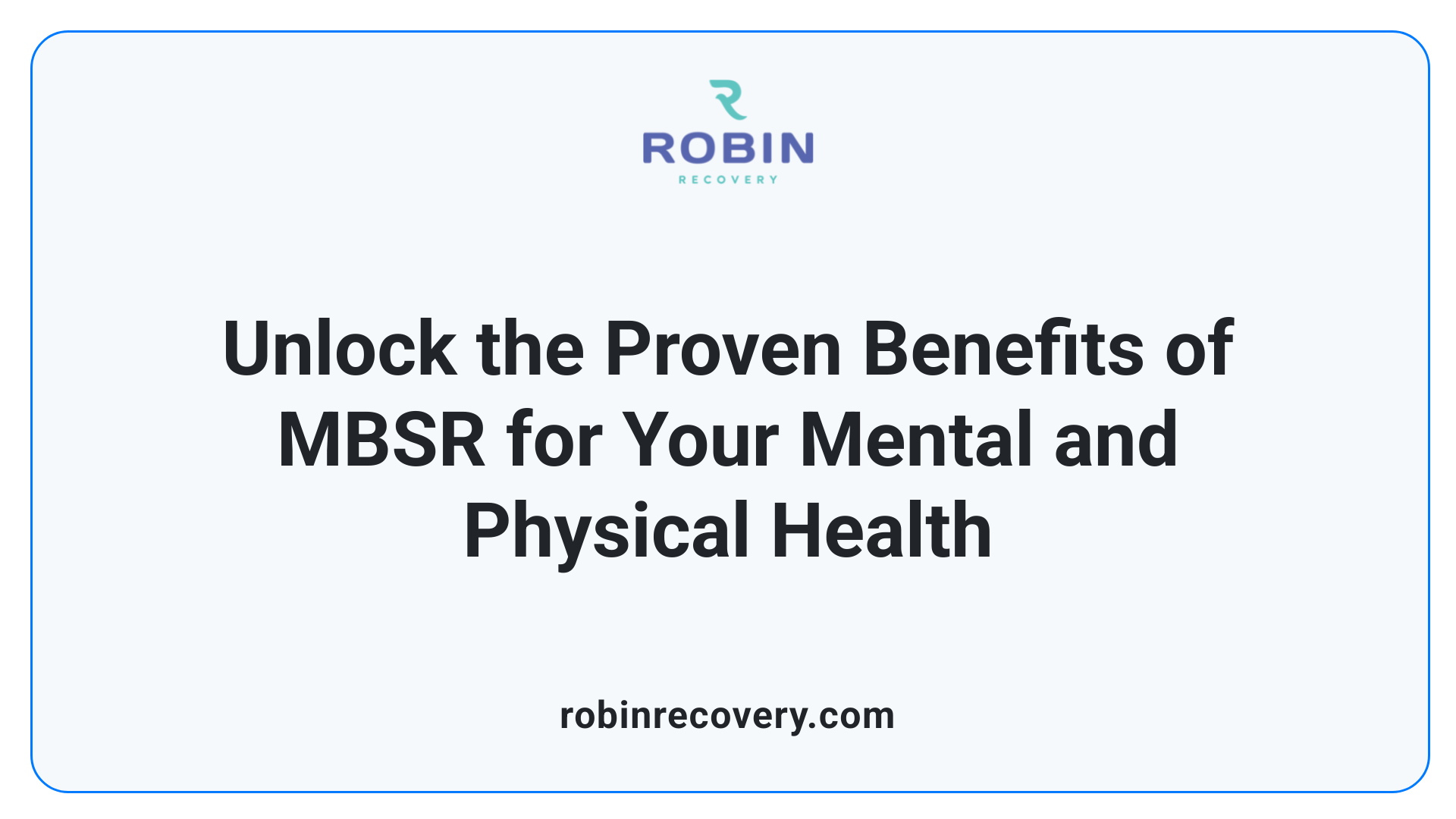Exploring the Potential of MBSR in Healing
Mindfulness-Based Stress Reduction (MBSR) has emerged as a prominent approach offering profound benefits in the realm of mental health and recovery. As more individuals seek holistic methods to manage stress and improve well-being, MBSR stands out for its evidence-based effectiveness. From managing anxiety and depression to aiding in pain management, MBSR provides a structured path to recovery, fostering resilience and emotional regulation. This article delves into the core aspects of MBSR, its practices, impacts, and the scientific backing that underscores its efficacy in recovery across various contexts.
An Introduction to MBSR

What is Mindfulness-Based Stress Reduction (MBSR) and how does it work?
Mindfulness-Based Stress Reduction (MBSR) is a structured program aimed at helping individuals manage stress, illness, and pain through mindfulness practices. Developed by Dr. Jon Kabat-Zinn in 1979, MBSR integrates meditation, yoga, and body awareness techniques to promote better emotional and physical health.
MBSR involves several core practices:
- Body Scans: Participants learn to identify and relax areas of tension within their bodies.
- Mindfulness Meditation: This technique encourages the observation of thoughts and emotions without judgment, fostering a deeper understanding of one's inner experiences.
- Yoga: Gentle stretches and breathing exercises help participants connect with their bodies and enhance overall relaxation.
The intended outcomes of MBSR include stress reduction, improved emotional resilience, and enhanced coping mechanisms for individuals dealing with chronic conditions. Research supports its efficacy in alleviating symptoms of anxiety and depression while promoting better sleep and overall well-being. By encouraging present-moment awareness, MBSR empowers individuals to significantly improve their quality of life.
Key Benefits of MBSR

What are the benefits of Mindfulness-Based Stress Reduction (MBSR)?
Mindfulness-Based Stress Reduction (MBSR) offers numerous benefits for both mental and physical health. Developed by Professor Jon Kabat-Zinn, MBSR is an 8-week program that incorporates meditation, yoga, and group sessions to enhance present-moment awareness.
Research indicates that MBSR can effectively reduce symptoms of anxiety and depression, with studies showing it may be as effective as antidepressants in preventing depression relapse. Participants often report improvements in mood and emotional regulation, with significant reductions in perceived stress and anxiety.
How does MBSR compare to traditional treatments?
Compared to traditional treatments, MBSR provides a holistic approach to managing stress and mental health issues. Unlike medications that may come with side effects, MBSR emphasizes self-awareness and self-care practices. Recent studies have noted its efficacy in treating chronic pain conditions, showing reductions in both pain intensity and duration.
Below is a comparison of outcomes related to MBSR and traditional approaches:
| Aspect | MBSR Outcomes | Traditional Treatment Outcomes |
|---|---|---|
| Anxiety Reduction | Moderate to large effect | Variable; often reliant on medication |
| Depression Prevention | Comparable to antidepressant efficacy | Primarily pharmacological; varying side effects |
| Pain Management | Reduction in pain intensity reported | Pain relief via medication; potential side effects |
| Emotional Regulation | Enhanced self-regulation and awareness | More focused on symptom management |
What self-regulation and emotional benefits does MBSR provide?
MBSR supports emotional regulation and self-compassion, contributing to improved overall well-being. Participants of MBSR programs often describe enhanced emotional stability, increased mindfulness, and a greater capacity for managing stress without impulsive reactions.
Research shows that practicing MBSR techniques like breath work promotes resilience against triggers that can lead to anxiety or substance use, making it particularly valuable for individuals in recovery.
MBSR's Efficacy in Mental Health Recovery

How effective is Mindfulness-Based Stress Reduction (MBSR) in reducing symptoms of anxiety and depression?
Compared with control therapies, pooled results suggest that MBSR significantly reduces anxiety, depression, and perceived stress while improving mindfulness. Research indicates that participants in MBSR programs often report lower levels of anxiety and depression and demonstrate reduced suicidal thoughts.
Scientific evidence supporting MBSR
Multiple studies have validated the effectiveness of MBSR in mental health recovery. A meta-analysis evaluating 29 studies with over 2,600 participants found moderate to large effects on anxiety, depression, and stress levels. Furthermore, MBSR was reported to be as effective as traditional antidepressants in preventing the recurrence of depression. Neuroimaging studies showed increased brain activity in areas related to emotional regulation in participants practicing MBSR.
Long-term effects of MBSR on mental health
The benefits of MBSR extend beyond immediate relief. One year after completing the program, participants often maintain improved coping mechanisms and heightened emotional awareness. Long-term benefits observed include sustained levels of inner calm, improved relationships, and an overall enhanced quality of life. Participants frequently report lasting benefits such as better sleep quality and increased emotional resilience.
Incorporating MBSR in Trauma Recovery

What role does mindfulness play in trauma recovery?
Mindfulness plays a significant role in trauma recovery by fostering a non-judgmental awareness of the present moment. This awareness can help individuals process traumatic experiences more effectively. Research indicates that mindfulness can mitigate trauma-related negative emotions and avoidance behaviors, which are common among those who have experienced significant trauma.
A study focusing on trauma-exposed veterans highlighted that mindfulness partially mediated the relationship between traumatic events and mental health issues, including PTSD and suicidal ideation. This suggests that enhancing mindfulness may lessen the mental health challenges associated with trauma. By allowing individuals to manage painful memories and emotional responses constructively, mindfulness practices contribute positively to their recovery journey.
Studies on mindfulness and trauma
Numerous studies have investigated the impact of mindfulness on trauma recovery. For example, a meta-analysis indicated that mindfulness interventions could significantly decrease symptoms of PTSD. Other research has shown that implementing MBSR techniques, such as breath-focused attention, leads to improved emotional regulation and resilience, which can be critical for trauma survivors.
Mechanisms by which MBSR aids trauma recovery
MBSR assists trauma recovery through various mechanisms:
- Enhanced Emotional Regulation: Practicing mindfulness improves individuals' ability to manage intense emotions that arise from traumatic memories.
- Reduction in Avoidance Behaviors: Regular mindfulness practice helps individuals face rather than avoid their thoughts and feelings, enabling more effective processing of trauma.
- Improved Cognitive Flexibility: Mindfulness fosters cognitive flexibility, allowing individuals to view their experiences from different perspectives, which is essential for trauma recovery.
These mechanisms underscore the efficacy of MBSR as a valuable tool in facilitating the healing process for trauma survivors.
MBSR Techniques and Their Application
What techniques are used in Mindfulness-Based Stress Reduction (MBSR)?
Mindfulness-Based Stress Reduction (MBSR) incorporates various techniques aimed at cultivating present-moment awareness and acceptance. Key practices include:
- Meditation: Focused attention practices that help participants acknowledge thoughts and feelings without judgment, enhancing self-awareness.
- Body Scans: A method to develop awareness of body sensations, promoting relaxation and reducing physical tension.
- Mindful Movement: This includes yoga, which encourages participants to connect with their physical bodies and breath.
Other exercises such as breath awareness, walking meditation, and mindful eating allow individuals to integrate mindfulness into everyday activities.
How can these techniques be integrated into daily routines?
Participants are encouraged to practice mindfulness techniques daily. Here are simple ways to integrate MBSR practices:
- Mindful Breathing: Take a few moments each day to focus on your breath, especially during stressful situations.
- Body Scan: Allocate time before bed to perform a short body scan, promoting relaxation and improving sleep quality.
- Mindful Eating: Engage in meals without distractions, savoring each bite to foster a deeper connection to food.
How can MBSR practices be adapted for different needs?
MBSR practices can be tailored to suit individual preferences and needs:
- Shortened Sessions: For those with time constraints, abbreviated mindfulness exercises maintain efficacy in stress reduction.
- Focus Areas: Specific techniques can be emphasized based on personal health goals—such as pain management or emotional regulation.
- Guided Sessions: Online resources allow for flexible practice settings, enabling users to engage in MBSR techniques in various environments.
Consistent practice of these techniques can lead to lasting benefits in emotional well-being and stress management, supporting recovery in various contexts.
MBSR and Pain Management

Impact on chronic pain conditions
Mindfulness-Based Stress Reduction (MBSR) has shown significant effects on individuals suffering from chronic pain conditions such as lower back pain and migraines. The structured 8-week program helps patients manage their pain by promoting an awareness of bodily sensations and fostering a calm state of mind, which can alleviate pain-related distress.
Mechanisms of pain reduction through MBSR
The reduction in pain perception associated with MBSR can be attributed to enhanced emotional regulation, where participants learn to observe their thoughts without reacting impulsively. This mindfulness practice leads to a shift in the brain's response to pain, reducing the emotional weight of pain experiences and increasing coping strategies.
Studies supporting pain management benefits
Research has consistently validated the effectiveness of MBSR in pain management. A study published in "JAMA Internal Medicine" found that participants reported significant reductions in pain intensity and improvements in mental health, correlating mindfulness practices with better pain outcomes. Further analysis highlights lasting benefits of up to 52 weeks post-program, emphasizing MBSR's role in enhancing quality of life while managing chronic pain.
Challenges and Considerations in MBSR Implementation
Research Gaps and Quality Issues
Despite the growing body of evidence supporting the efficacy of Mindfulness-Based Stress Reduction (MBSR), there remain notable gaps in research quality. Many studies have small sample sizes or lack robust methodological designs, making it challenging to generalize findings. Future research should focus on larger, more diverse populations to strengthen the data supporting MBSR's effectiveness.
Best Practices and Adaptations
Adapting MBSR programs to fit specific populations, such as healthcare professionals facing burnout or individuals with high-stress jobs, can enhance relevance and effectiveness. Abbreviated versions of MBSR have been shown to maintain efficacy, making the program more accessible in demanding environments.
Common Challenges Faced by Participants
Participants in MBSR may struggle with consistent practice, particularly with daily mindfulness exercises. Initial discomfort with meditation or yoga can also pose a barrier to engagement. Providing supportive environments and encouraging community participation can help address these challenges and increase adherence.
The Future of MBSR in Recovery
MBSR continues to gain traction as a compelling option for those seeking to manage stress and enhance recovery processes across mental and physical health domains. As research evolves, the integration of MBSR in therapeutic settings is likely to expand, providing individuals with accessible, non-invasive tools for well-being. By understanding its techniques and benefits, patients and healthcare providers can collaboratively promote more resilient and adaptable recovery pathways. The exploration of MBSR's full potential is ongoing, promising further innovations and insights into stress management and holistic health practices.
References
- Health Benefits of Mindfulness-Based Stress Reduction
- The Effectiveness of Mindfulness-Based Stress Reduction on the ...
- The Role of Mindfulness and Mental Health in Injury Recovery
- Exploring the Benefits of Mindfulness-Based Stress Reduction (MBSR)
- Mindfulness-based stress reduction: Types and benefits
- Mindfulness-based stress reduction for healthy individuals: A meta ...
- Effects of Mindfulness-Based Stress Reduction (MBSR) on Emotion ...
- What Is MBSR in Addiction Recovery?

.svg)

.svg)

.svg)
.svg)























.jpg)





.jpg)














